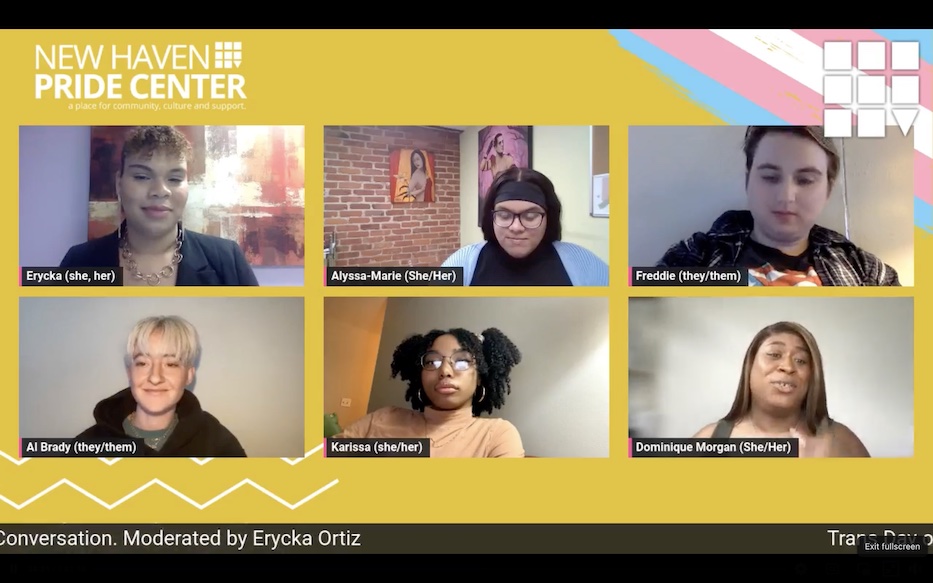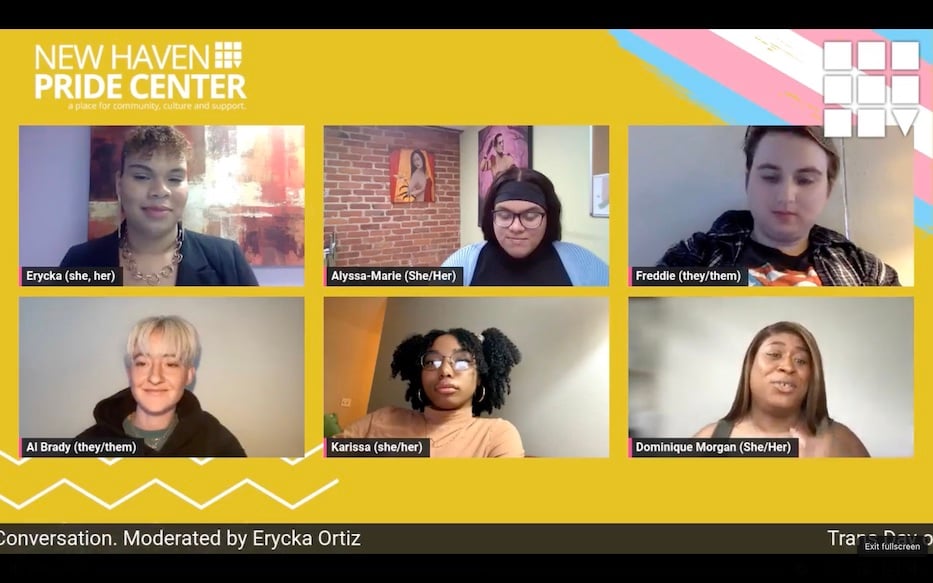
Culture & Community | LGBTQ | Arts & Culture | New Haven Pride Center | Trans Day of Visibility

New Haven Pride Center Screenshot.
The words echoed over dozens of screens, musical even across the digital distance. Connected. A beat. Renewed. Breath, and then a murmur of appreciation. Thankful. One after the other, they rolled off speaker’s tongues, taking on a life of their own. Grateful. Excited.
Last Friday evening, six LGBTQIA+ activists brought those words to a single conversation, highlighting the importance of joy, representation and safety for trans people on Transgender Day of Visibility (TDOV), and all year long. Hours after advocates raised the Trans Pride flag over the State Capitol for the first time in Connecticut history, the six gathered virtually, laying a path to LGBTQIA+ liberation.
“I really wanted to have more of a conversation,” said moderator Erycka Ortiz, a field organizer for the ACLU of Connecticut who is also the director of organizing for the Children of Marsha P. Johnson. “We really don't want to limit this space …[we want to] be as expansive as possible, just like trans people and the entirety of the LGBTQIA+ community.”
Panelists included Ortiz; The Okra Project Founder and Director Dominique Morgan; Children of Marsha P. Johnson Director of Operations and organizer Alyssa-Marie Cajigas Rivera Ortiz; Our Climate Voices Founder Al Brady, former New Haven Pride Center employee Freddie Swindal, and LGBTQ+ activist Karissa, who used only her first name.
From the beginning of the hour-long conversation, each of the speakers looked to the ways in which a more welcoming world for trans people (and all historically marginalized people) was entirely possible—if more people could just accept their basic humanity. Speaking early in the evening, Cajigas Rivera Ortiz recalled the first time she learned about the underground ballroom scene in New York City. It opened her eyes to a world of possibility.
It was the end of her senior year of high school, and she had never witnessed anything like it. That alone was a revelation—but the Legendary Kelly Mizrahi took it to entirely another level. For the first time, she realized that trans people were out in the world celebrating who they were, and that there were safe, intentional spaces for them to do it. That they were also underground spaces is something that Cajigas Rivera Ortiz is still thinking about constantly in her organizing work.
"I was like, 'Oh. We exist. We're out here,'" she remembered as other attendees nodded knowingly on the screen. “Ballroom community for me is where I first sort of felt visible, because I was able to see a lot of other folks that looked just like me.”
Other panelists also noted the importance of hard-fought and hard-won joy. Morgan, who for years led Black & Pink National in the fight to both change and end the carceral state, picked up the conversation from her bright box at the lower right hand corner of the screen. Because she transitioned medically at 38 years old, she said, she didn’t realize that there were successful examples of trans women around her until slightly later in life.
It wasn’t that they weren’t there, she clarified—she wasn’t specifically looking.
Now, she focuses on letting those people, to whom she refers as “possibility models,” know how significant they have been in her life. She also tells her story to the young people in her life, with the hope that it may help them move forward.
"Most people who are in these deep intersections of oppression, you usually are just trying to live your life,” she said. “You usually are just trying to get your piece of whatever is this thing that's life. And the bonus is that through you wanting to live, through you wanting to manifest a space where you can thrive, other people kind of get a piece of a blueprint."
Karissa, who identified herself as a cisgender ally, also noted the importance of representation in the fight for justice. A few years ago, she was watching the wedding-focused television show “Say Yes To The Dress” and spotted a queer couple in one of the episodes. She realized it could be her, and was excited to see some version of her life mirrored on t.v.
"That was one of the few times where I identified with the representation that I was seeing,” she said.
For her, she later added, everyone deserves that level of representation—and then some. It currently worries her how many cis women, across political lines, still perceive transgender women as a threat. Examples of that discrimination abound, from pop culture to attacks on trans women and girls on the playing field to anti-trans bills that make it into the Connecticut state legislature.
“I want more cis women to know that the trans community, they are not a threat whatsoever to us,” she said. “We all are people. We all are human. We all have rights. We all deserve love, we deserve to be seen, we deserve to be heard … We deserve all of that. And uplifting the trans community will not take away from cis women."
"I deeply believe that when thinking about liberation, we can't have it without including all of us,” Ortiz chimed in later in the discussion, returning to the same point.
Other panelists focused on the role that boundary setting and euphoria—a word that Ortiz chose very specifically—plays in their fight for freedom. After speaking openly about a very hard coming out experience, Brady said that they have fought hard to find “that liberation in myself first.”
Sometimes, it may look like nearly a dozen outfit changes before they’ve settled on the day’s wardrobe. Sometimes, it may just sound like the word “no.” It means no longer rushing themselves through the motions for the sake of efficiency.
That also resonated for Swindal, who formerly worked as the manager of support services at the New Haven Pride Center. As other panelists fell silent, they spoke openly about quitting a different, more recent job after six weeks, because of the amount of transphobia and homophobia they faced in the workplace.
For weeks, other people assured them that they were trying to do better, and that the climate would improve after a workplace sensitivity training in May. Swindal ultimately realized the power in not waiting it out.
They added that for them, liberation is feeling more confident in their body than they did 10 or 15 years ago. A decade ago, they were terrified of needles. They hated hearing the sound of their own voice. Now, they can manage their own hormone replacement therapy—to which they play a Queen song in homage of their namesake, Freddie Mercury, each time.
"I feel like that's where the liberation appears, in the day to day for me,” they said.
At a time when trans lives are constantly under attack—in state houses and houses of worship, in families and friendships, in workplaces and recreational spaces as well—Cajigas Rivera Ortiz also noted the importance of stepping into freedom wherever she can find it. Before a recent trip to her first home of Puerto Rico, “there was always this fear for me” as an openly trans woman.
But when she arrived in San Juan and stepped out onto the street in the dress she had picked out, that fear melted away. A reconnection with land, people and culture bloomed in its place. She felt at ease in her own skin and her body.
“I've never felt more free and liberated than I did when I was back home,” she said. “Like, Connecticut's cute. But doing that back home on the motherland, on the island, it was just very different."
It’s a feeling that she holds onto back in Connecticut, as she does statewide organizing, youth engagement and advocacy work for the Children of Marsha P. Johnson. The goal of the organization, an outgrowth of an annual Black and Brown Queer Camp that turned five last summer, is "to develop a new generation of organizers in the state that are Black, Brown, Indigenous, and LGBTQ+ in a framework that we identify as anarchal Black trans feminism," she said.
Morgan jumped back in, agreeing that freedom can also happen one step at a time. Alongside it, she said, she sees a need for greater solidarity among all women, and particularly those who have been pushed to the historical margins. She noted that reproductive rights are and must be part of that conversation, because they are also a trans rights issue.”
“Us together, which is the thing that scares them the most, is what will position us to be able to talk about impacts of reproductive justice,” she said. “Imagine a world where a trans woman, no matter what she does to her body or face, is affirmed, and her affirmation means more space for you.”
She added that she tries to exist outside of expectations set by both Hollywood and social media, where the images of “successful” trans people feels arbitrary and sometimes unattainable She recognized "the idea of being a 'good' trans person,” as one in which cisgender people often turns to trans people to explain things to them
“If you are seeing all of these moments, it can be difficult to name that you got up that morning and you smiled and you washed your face, and you loved how you looked in the mirror,” she said. “And that is your definition of euphoria for the day."
Listen to the full conversation in the video above.

